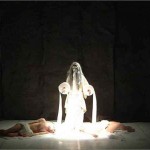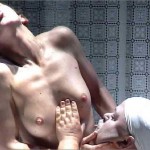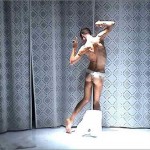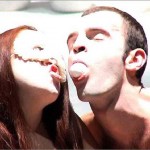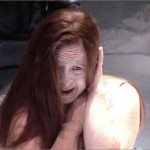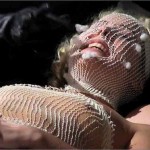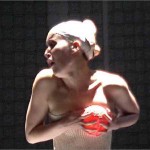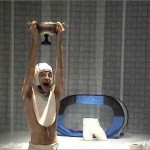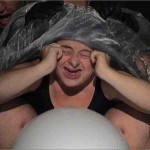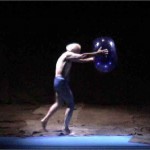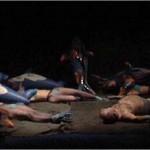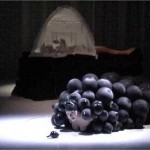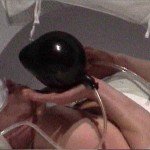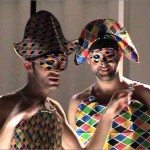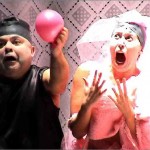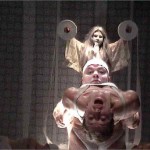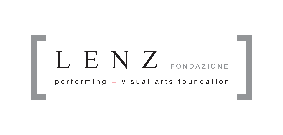
FAUST II
New actors' bodies, new scenic landscapes make up this summa of Faust II: the chiaroscuro of the original tragedy take on the bright colors of a post-pop and Disney-like contemporaneity, in an imaginative and phantasmagorical chaos that deeply adheres to Goethe's fresco.
It's in the “continuous juxtaposition of human appearance and inhuman appearance”, as Franco Fortini defined it in the introduction to Faust which he translated in full, the clearest analysis of Lenz Rifraczioni's staging. A juxtaposition that Fortini traces back to the vision of a Puppenspiel, or a Faust for puppets, which Goethe had the opportunity to see while still a teenager and whose influence would accompany him throughout his life, from the beginning of Faustian writing, not yet thirty years old, until his final birthday at eighty.
Thus Lenz Rifrazioni recovers and pays homage to this vision from the first scene of Faust 2, that “Dedicate” which in Goethe's original text was located at the beginning of the work and which starts here from the Puppenfaust that Fortini talks about, recalling with nostalgia the vision of the puppets seen as a child, while the classically dressed old dramatic poet holds a book dedicated to the life of Walt Disney in his hands, supreme creator of phantasmagoria. And the end of Faust, blind to death, it will take place in the din of a Ducks' merry-go-round “disneyani”, distant and noisy, childish echoes of a dying man. Twenty scenes make up Faust II in the rewriting in verse by Francesco Pititto, who directs it together with Maria Federica Maestri, creator of the sets and costumes.
The completion of the imposing musical work by Adriano Engelbrecht and Andrea Azzali is part of the journey of a suite: a proceeding through sequences of profoundly different and formally distant sound natures. The fresco that is offered to the ear is an itinerary over the course of musical genres and forms, from the Bachian call of searching to the rhythm of bass, battery di songs pop, from the timbral elaborations of some famous Sinatra songs to the melodic incursions of cellos, violas and programmed percussion.
The dramaturgical journey begins with the awakening of Faust. The battle of his heart has ceased and the remorse for Margherita's death has vanished, he emerges unpunished from the shell of sleep and begins the journey of purification of the soul between ancient myths and medieval sagas. Ariel, which closed Faust I, suspended from a cloud of black balloons it will reopen to the new landscape, to the new venture towards the Emperor's Palace, towards the Dark Gallery where Faust will meet the Mothers and the Key to rediscover the new beauty, the physicality of the soul, represented by the heroic body of a man who can stand up only with the help of Faust. In the Hall of the Knights, the meeting with Helen and Paris will indicate the way to the new world towards which new openings can be glimpsed. The Sirens and the Dolphins, Erichto e le Lamie, off to the High Mountains and the Open Country where Philemon and Baucis will suffer the final violence.
It all ends with the death of Faust and the ascension of his immortal part to heaven. “A Penitent, already Gretchen” come indica Goethe, welcomes him at the passage between earth and ether, while in the last step before the threshold a fragment of Friedrich Hölderlin's Hyperion resonates, nostalgia for the youthful Faustian strebens.
Director's notes on Faust II by Maria Federica Maestri
Faust II is the final dramaturgy of Lenz's design fury Refractions on Goethe's Faust. In Corpo's opera is Faust, in search of dying and reborn matter, transitive seat of the ecstatic experience of becoming. Faust in reclamation of biological geographies, in tracing new boundaries to the intellectual delegation affects itself the changing traits of the hermits of life. Faust heir of black airs, of worlds without the color of color, raised on pedestals of sensorial solitudes, greet the dawn of the new paradise. At the center of the cosmogony of the rising gods stands the Emperor, short and pompous majesty of the theater building.
Patriarch of the pantomime induces Faust to the courtesan party, and holds him in the silent abyss of the dwarf giant being. Mixture of nature and intelligence, Mephisto's double youth, mattana chromosomal and double sex, it sticks into her feminine hips. At the sight of intestinal mothers who announce life and portend death, Faust bows to the dynamic verb of the wheel, favorite carriage of metaphysical dramatization. Faust in will of perpetual images, of eternal cognitive installations, takes shape in the unwelcome destinies of motionless heroes, to search for the key to the truly powerful.
Intertwining of tetraplegic memories, Paris and Helen show themselves, solitary pearls in the divine void with no return. On the reverse side of old age, illness, deformity of the canon appear, Faust sees power and essence of purity. Human gold digger, Faust in the neoclassical Far West of his Western cult requires the last garrison to be revealed, and lays siege to the funeral hut in Canova fashion of Philemon and Baucides. Old, like films of tribes forever named in childhood memories, abandoned by the gods of nature, alone on the prairie without wild winds, waters, trees, bison, eagles, cavalli, they are killed by the dreamless truth, from time without eternity. Faust dies from these dead skies due to contagion and returns to the Thebaid without hearts, where he meets the girl who was Margherita, who, mocked and mad, resurrects like Diotima as a child, true heroine of the turreted poet, as a farewell to the era of beauty songs.
FAUST II
dal Faust di Wolfgang Goethe
translation | playwriting || Francesco Pititto
regia || Maria Federica Masters | Francesco Pititto
musica || Adrian Engelbrecht | Andrew Azzali
scene | costumes | plastics || Maria Federica Masters
interpreters || Joseph Barigazzi | Marcello Cavilli | Pierluigi Feliciati, Joseph Impresable | Sara Monferdini | Elisa Orlandini | Alessandro Sciarroni | Sandra Soncini | Barbara VogheRA
production || Lenz Refractions
first || Lenz Theatre, Nature Gods Theater Festival, Parma, 2002
duration || 120 minutes with 15 interval minutes







